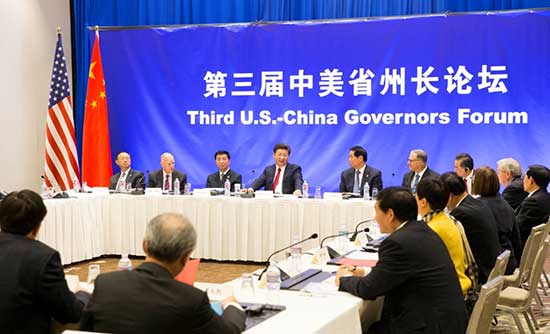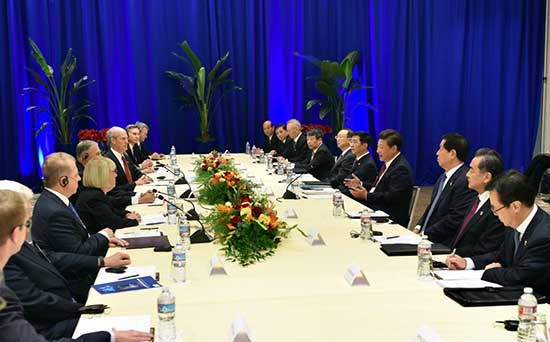


President Xi Jinping delivers a speech during a welcome banquet jointly hosted by Washington State government and friendly communities in Seattle, the United States, Sept 22, 2015. (Xinhua/Photo)
Chinese President Xi Jinping was present at the Third China-U.S. Governors Forum in Seattle and delivered a speech on Sept. 22, 2015. He also met with Washington Governor Jay Inslee, Seattle Mayor Ed Murray, Senator Patty Murray, Congressman Rick Larsen, former Ambassador to China Gary Faye Locke and others in Seattle. Besides, President Xi addressed a welcome banquet jointly hosted by Washington State government and friendly communities in Seattle.
If we put contents of Xi's speeches together, the words will exceed ten thousands. But what did President Xi talk about and what is the focus? Let's summarize them to six key facts, so that you'll have a easy understanding.
Reveal one reason: Why Seattle is the first stop of Xi's state visit to the United States
Washington is the leading state in US export to China and China is the number one trading partner of the Port of Seattle. Washington and Seattle have become an important symbol of the friendship between Chinese and American people and the win-win cooperation between the two countries.
Washington State and Seattle are the US gateway to China and Asia. In recent years, bilateral economic and trade and cultural exchanges saw increasingly close and achieved fruitful outcomes. When the two countries just established diplomatic relations for three months, the Chinese cargo ship Liulinhai sailed to the port of Seattle, marking the end of a history of 30 years without shipping services between China and the US. At present, Washington's exports to China ranks No.1 in the US for three consecutive years. After the catastrophic Wenchuan Earthquake of 12 May 2008, students of primary school in Pierce County, Washington State, wrote more than 800 condolence letters and greeting cards to their counterparts in quake-hit region.

Chinese President Xi Jinping attends the Third U.S.-China Governors Forum. (Xinhua)
Show two goals: Interpretation of the two centenary goals to the American people
Development remains China's top priority. To any one charged with the governance of China, their primary mission is to focus all the resources on improving people's living standard and gradually achieve common prosperity. To this end, we have proposed the two centenary goals, i.e. to double the 2010 GDP and per capita income of the Chinese and complete the building of a moderately prosperous society by 2020 and to build a prosperous, strong, democratic, culturally advanced and harmonious modern socialist country and realize the great renewal of the Chinese nation by the middle of the century.
Table a three - point proposal for the development of bilateral cooperation at local level
Firstly, China and the United States should make effective use of the opportunities unleashed by the large size of their economies.
Secondly, the two countries should share the benefits generated by their respective reform and development policies. China's reform and opening up policy and the U.S. policies and strategies to adjust its economic structure have created opportunities for cooperation.
Thirdly, China and the United States should tap the potential of their complementary advantages.
Stress four things - to promote the new type of major-country relationship between China and US at a new starting point
First, we must read each other's strategic intentions correctly. We want to deepen mutual understanding with the US on each other's strategic orientation and development path. We want to see more understanding and trust, less estrangement and suspicion, in order to forestall misunderstanding and miscalculation.
Second, we must firmly advance win-win cooperation. If China and the United States cooperate well, they can become a bedrock of global stability and a booster of world peace. Should they enter into conflict or confrontation, it would lead to disaster for both countries and the world at large. The areas where we should, and can, cooperate are very broad.
Third, we must manage our differences properly and effectively. China and the United States do not see eye to eye on every issue, and it is unavoidable that we may have different positions on some of the issues. What matters is how to manage the differences. And what matters most is that the two sides should respect each other, seek common ground while reserving differences, take a constructive approach to enhance understanding and expand consensus and spare no effort to turn differences into areas of cooperation.
Fourth, we must foster friendly sentiments among our peoples. People-to-people relations underpin state-to-state relations. Though geographically far apart, our peoples boast a long history of friendly exchanges.

Chinese President Xi Jinping (4th R) meets with Washington Governor Jay Inslee, Seattle Mayor Ed Murray, Senator Patty Murray, Congressman Rick Larsen, former Ambassador to China Gary Faye Locke and others in Seattle, the United States, Sept. 22, 2015. (Xinhua/Li Tao)
Make five judgments - basic situation and trends of China's economy
First, the Chinese economy is still operating within a proper range. It grew by 7% in the first half of the year, and this growth rate remains one of the highest in the world.
Second, at present, all economies are facing difficulties, and our economy is also under downward pressure. But this is only a problem in the course of progress.
Third, China is continuing to move forward its new type of industrialization, digitalization, urbanization and agricultural modernization. China has a high savings rate, a huge consumption potential, a hard-working population and a rising proportion of middle-income people. This creates an enormous space for the services sector and offers a big market with great potential.
Fourth, the Chinese government took steps to stabilize the market and contain panic in the stock market and thus avoided a systemic risk. Mature markets of various countries have tried similar approaches. Now, China's stock market has reached the phase of self-recovery and self-adjustment.
Fifth, on 11 August, China moved to improve its RMB central parity quotation mechanism, giving the market a greater role in determining the exchange rate. Our efforts have achieved initial success in correcting the exchange rate deviation. Given the economic and financial situation at home and abroad, there is no basis for continuous depreciation of the RMB.
Announce six policies - response to the concerns of the international community
I. China's economy will stay on a steady course with fairly fast growth.
We will take coordinated steps to achieve stable growth, deepen reform, adjust structure, improve livelihood and prevent risks, while strengthening and innovating macro regulation to keep the growth at a medium-high speed.
II. The key to China's development lies in reform.
We have the resolve and the guts to press ahead and take reform forward. We will stick to the direction of market economy reform and continue to introduce bold and result-oriented reform measures concerning the market, taxation, finance, investment and financing, pricing, opening-up and people's livelihood.
III. China will never close its open door to the outside world.
Opening-up is the basic state policy of China. Its policies of attracting foreign investment will not change, nor will its pledge to protect the legitimate rights and interests of foreign investors in China and improve its services for foreign companies operating in China.
IV.China will follow the basic strategy of the rule of law in governance.
China will give fair treatment to foreign institutions and foreign companies in the country's legislative, executive and judicial practices. We are ready to discuss rule-of-law issues with the US side in the spirit of mutual learning for common progress.
V. China will continue fighting corruption.
China is ready to cooperate closely with international community in fighting corruption and tracking down fugitives. The Chinese people look to the US for support and coordination so that corrupt elements will be denied an overseas "safe haven".
VI. China will keep to the path of peaceful development.
China will never seek hegemony or engage in expansion. To demonstrate our commitment to peaceful development, I announced not long ago that the size of China's military will be cut by 300,000.
 Construction of HK-Zhuhai-Macao Bridge enters final stage
Construction of HK-Zhuhai-Macao Bridge enters final stage Model of heavy-lift copter makes debuts at Tianjin expo
Model of heavy-lift copter makes debuts at Tianjin expo Art photos of Chinese beauty in Han Chinese clothing
Art photos of Chinese beauty in Han Chinese clothing Stunning photos of air show in China’s V-Day parade
Stunning photos of air show in China’s V-Day parade Models change clothes on street in Hangzhou
Models change clothes on street in Hangzhou Charming Chinese female soldiers
Charming Chinese female soldiers Beauty vs. muscular man
Beauty vs. muscular man World's passenger plane giants convene in Beijing aviation expo
World's passenger plane giants convene in Beijing aviation expo First day in kindergarten
First day in kindergarten Cheating Canada
Cheating Canada Fall of the front
Fall of the front NDRC defends credibility of GDP data
NDRC defends credibility of GDP data Xi-Obama meet can set template for future
Xi-Obama meet can set template for futureDay|Week